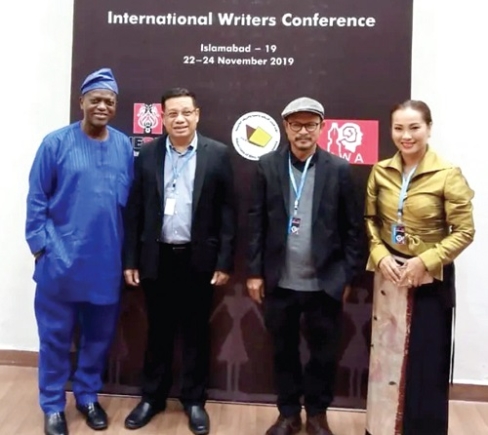
A Memory of Pakistan
Islamabad. Early morning. I am standing at the immigration desk of the Islamabad International Airport, trying to explain to the Pakistani immigration officer my reason for visiting the South Asian country.
Advertisement
He also wanted to know why I had to go all the way from Lagos to London then Dubai before coming to his country. Satisfied with my explanations, the happy looking burly officer gingerly stamped my passport and waved me off with a cheery ‘Welcome to Pakistan’.
As I waited to collect my baggage, my mind went to my brief encounter with the immigration officer, especially his concern about my itinerary. It was the same question I had been asked when I applied for a Pakistani visa in Abuja. It was also the same question when I wanted to board my Emirates flights in Lagos, London and Dubai.
Even though I had decided on my itinerary in order to accommodate a private visit to the UK before going to Pakistan, I did not realise that I had inadvertently put myself under a suspicious radar by that decision.
“Pakistan is currently fighting a twin problem of drug trafficking and terrorism. That is why travellers with multiple stop-overs are usually put under extra scrutiny,” one of my Pakistani hosts later explained to me.
Extremely cold
Outside the airport, I had to button up my jacket as the chilly 10 degrees Celsius weather hit me like a cold brickbat. “November is still a good time to visit Pakistan. Our coldest month is January when the weather could go as low as 2.6 degrees Celsius,” my guide who had come to pick me up at the airport said.
As I was driven from the airport in the early hours of the morning, I admired the beautiful and sleepy city which was said to have been built as a planned city in the 1960s to replace Karachi as Pakistan’s capital city.
Pakistan, officially the Islamic Republic of Pakistan, came into being following the partitioning of British India into the countries of India and Pakistan on August 14, 1947. After this partition, the north-eastern and north-western flanks of the country, made up of Muslim majorities, became Pakistan.
The rest of the country, predominantly Hindu, but also with large religious minorities peppered throughout, became India. It is the world’s fifth most populous country with a population exceeding 212.2 million. By area, it is the 33rd largest country, spanning 881,913 square kilometres (340,509 square miles).
Partitioning effect
Even though it took place more than 70 years ago, the partitioning has left some deep-rooted resentments between India and Pakistan. Fortunately, there have been numerous attempts to improve the relationship.
However, despite those efforts, relations between the countries have remained fraught, following repeated acts of cross-border terrorism. According to a 2017 BBC World Service poll, only five per cent of Indians view Pakistan’s influence positively, with 85 per cent expressing a negative view, 11 per cent of Pakistanis viewing India’s influence positively, with 62 per cent expressing a negative view.
I had come to Pakistan to attend the annual International Writers Conference of the Writers Union of Africa, Asia and Latin America. In addition, I had also been invited by the Pakistan National Council of the Arts and Hunerkada to attend the 2019 Islamabad Arts and Book Festival also holding in the Pakistani capital about the same time.
Arrival
While I was to present a report in my capacity as the Deputy Secretary General of the Writers Union during the conference, I had also come to Islamabad with copies of my novels for presentation at the book fair.
About an hour after my arrival in Islamabad, I arrived at my hotel, Embessidor Hotel located at Sector G- 5 of the city, where I was heartily received by my hosts and other conference delegates who had arrived ahead of me.
It was nice seeing my fellow writers again after our last conference which took place in Rabat, Morocco.
Some of the writers who had already arrived at the hotel included delegates from Egypt, Lebanon, Sudan, Vietnam, as well as Jordan. I also saw some new faces such as Bui Viet Thang from Vietnam, Said Salgawi from Omanm as well as Toy Ting from Thailand.
On hand to receive all of us was our chief host, the ebullient Pakistani poet and book seller, Imdad Aakash, who is also the Secretary General of the Pakistani Writers Union.




